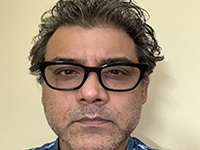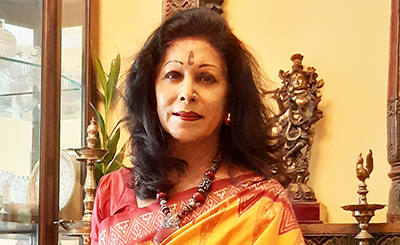
A fleeting feeling of experiencing life
Writing fills me with vacuum, doubt, haze, and fear. Should writing do that? I don’t know. But it does. Yet, the act of writing creates an illusion of bringing something—a person or a place or the relationship between the two, for instance— into existence, no matter how flawed or ephemeral it might be. It lures you into an unknown world full of puzzles, riddles and mysteries. It gives you a fleeting feeling of experiencing life with its contradictions and paradoxes, its ugliness and beauty. You mistake the finite for the infinite, transitory for the permanent. You see things no one else sees. And then, you marvel at them until they crumble one after another. You see the rise and fall of hope.
One more poem, one more sentence, one more word… It’s an endless quest for something that may or may not exist after all.
The first poem I wrote wasn’t mine. I was 10 years old. My father had asked me to read and write. Discover life, he said. I’m still trying to discover.... knowing that the process is an ongoing one — it could take a lifetime. Maybe one lifetime is not enough. Or maybe even a day or an hour is enough for such a discovery. What does it take? Will? Passion? Reason? Or Madness? I don’t know.
Maybe that’s why we exist — to endure the unendurable, to explore the unexplorable, to experience the unexperiencable, to express the inexpressible, and to dream the undreamable.
1.
I Have Forgotten Your Name
I have forgotten your name.
I don’t know what to do,
whom to ask.
I search for it everywhere.
It is nowhere,
Yet everywhere.
It has abandoned me
Like life
Abandons a man about to die.
I search
In the high mountains
And in the deep seas
And in the dead memories
Of dead people.
I knockat the doors of old dreams —
Everydoor shuts on me
As if I were a ghost.
I peer at Black holes
That are said to carry the ashes of stars
Long dead and gone,
Separated from us
By infinite lightyears — their black light lost forever
In the universe.
And now, as if by magic or witchcraft,
A photograph tumbles out of my pocket.
On it is written a name,
Which once was my life.
So it goes —
That once we did something together —
Something that can never be done
In life
Or in a dream.
How beautiful you are
This moment!
Your eyes…
They make everything stop.
Hands of all clocks
Come to rest, at last,
On top on each other.
Even Time feels cheated
That it can’t conjure you up
The way it conjures everything else up.
It can’t do things that you do
Like touching a dead man and
Bringing him back to life,
Giving him another chance in this world.
You sing to the mountain breeze.
The mountain breeze sings back to you:
‘Make me yours, take me with you.’
Years from now,
People will shun their memories,
Disown their ancestors,
Because you won’t be in their lives
Orin their dreams.
They will pray for sadness,
But sadness will keep them waiting.
They will be condemned to lead happy lives,
And, therefore, they will never know the taste of happiness.
I cling to a forgotten name
Like an orphan clings to someone else’s mother.
And, at last, as if by magic or witchcraft
You pass by me
Like a young comet passes by a dying planet
One last time,
Leaving it with a scar
For the rest of its descent.
In this very moment, everything comes back to me.
Everything, but your name.
Tell me, did we ever meet?
Or is our separation
The separation of stars?
What if happiness is sadness and sadness happiness?
What if we have mistaken death for life and life for death?
What if we have mistaken fear for love and love for fear?
It was predicted that a day would come
When someone else will weep my tears and
Laugh my laughs.
It was predicted that someday
You will rid me of this disease; this disease which is
Taking me down
The garden path
And leading me to the darkest of gardens
Full of rotten roses.
2.
The Affliction
The day the doctor whispered a name into my ear,
the tiny bridges running across the islands of your memory
collapsed one by one,
until one island didn’t know the whereabouts of another.
And then,
you lost the sense of time,
of relationships,
of the true nature of things.
I became your grandfather; your granddaughter became your wife;
your wife became someone else, your daughter-in-law or a stranger.
I told you it was nothing but the sting of a flower
that blooms once in a hundred years,
its infectious scent having entered your bones
through the flaky skin of your withered body,
leaving you with this yellow rash,
causing no pain.
You can still dance
your old dance.
Nothing can prevent you from watering the evergreens
in the courtyard of our rented house.
The landlord will be happy.
Nothing can keep you from doing your favourite things:
polishing our shoes, arranging them artistically in the shoe-rack
as though they were books.
You can still eat your favourite dish — rice and curd — with your hand,
even if, sometimes, the hand holding the morsel of rice
reaches for your right ear, instead of your mouth.
It’s all right—my hands betray me too
Every single day. Weary they are, just like yours.
You can still use the old centrifuge to separate the good cells from the bad,
and to determine the true cause of any affliction.
This affliction will go away; you must know it’s not harmful.
You will learn to live with it.
Perhaps I might inherit it, too.
Then both of us will do things we always wanted to do:
dig the soilin winter,
run away to the woods to listen to the songs of the hoopoe,
play poker even if the cards deceive us.
You must know that the infectious scent of this strange flower
has entered your body through the porous skin
and killed the very cells that cause fear.
You must know that the memory you have lost was not worth retaining.
The remembrance of me, too, will fade away.
You will forget your way back home if you ever go to the market.
But you must know that all roads lead to your old house.
One never gets lost in the world.
You will forget everything you ever possessed;
even the symbol tattooed on your arm.
One day, you will become a flower, and, as days progress,
it will rid you of your affliction.
3.
How to Say a Prayer
‘No, no, that’s not how you do it,’
she says to me,
gently,
touching my hand.
‘Then how?
show me, please,’ I say to her.
‘Don't utter the first word yet,
not so quickly, at least.
Wait
until you
hear the scream
of a man
about to die
before his time.’
‘Give me such a word,
one such word,’
I say to her,
knowing that such a word
does not exist.
Not yet, at least.
‘Is there another way?
An easier way?
How about this:
Death comes rushing to life. “Take me please,” she says,
“Hold me right now. Don’t let me go!”
What do you think?’
‘No, no,’
she whispers to me, gently,
kissing me with her eyes.
What was that?
What do you call that?
Something like that…
4.
New Roots
(19 January 1990 – 19 January 2022)
19 January 1990,
the colour of fright,
an unvoiced decree,
and the last metamorphosis.
Afar—
A sunset on the stairs,
Blood dipping on the saffron-bud,
Fear,
Shrieks,
The deafening curfew,
A gaping wound on the forehead
And the paralysis of the shadow.
Exile shakes the pillars of our conscience
A caravan of days is lost.
We have no seasons,
No walls to hang pictures
Of our ancestors.
History weeps through the eyes of the old,
And children,
Housed under canvas
Play mute.
A snake-bite
A sunstroke
An accident
And then the curtain.
A civilization dangles between
The horoscope and the computer.
The young see visions
Even at the crematorium.
Dreams of settlement flow.
A new strangeness
A new land
And the nomads discover
Some new roots.
The essay and the poems are part of our Poetry Special Issue (January 2022), curated by Shireen Quadri. © The Punch Magazine. No part of this essay or the poems exclusively featured here should be reproduced anywhere without the prior permission of The Punch Magazine.
More from The Byword
Comments
*Comments will be moderated










THUMBS.jpg)
